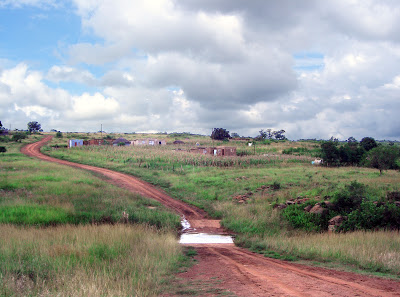

| Visitors Now: | |
| Total Visits: | |
| Total Stories: |

| Story Views | |
| Now: | |
| Last Hour: | |
| Last 24 Hours: | |
| Total: | |
We Must Remove the Landmines That Limit Access to Biotechnology in Africa
 |
| Scene from maize growing rural Kwa-Zulu Natal. Image D. Tribe |
November 21 2012. Motlatsi Musi at Truth about Trade:
Back in the dark days of apartheid, many South African farmers like myself were forced to drive our tractors through fields full of landmines as we worked hard to grow maize and other vegetables.
That’s now a part of history, thank goodness. Yet farmers in today’s Africa continue to face landmines of the metaphorical variety: As we try to obtain access to the latest agricultural technology, we see hazardous obstacles everywhere. They must be removed.
If our continent is ever going to feed itself, we’re going to have to beat the odds–and adopt the same tools that are taken for granted in so much of the developed world. That means we must have access to seeds improved with biotechnology.
I’ve seen the benefits of GM crops firsthand. Just south of Johannesburg, I own several acres of land and rent more. For the last eight years, I’ve grown genetically modified corn and soybeans. They are outstanding crops. My yields have improved by more than one-third, meaning that the economics of farming never have been better. Agriculture doesn’t have to be a subsistence occupation. It can be a sustainable profession.
Economics are only a part of it. GM crops are more sustainable for the environment and human health as well. The biotech variety I planted protects maize from stalk boring insects, so I don’t have to apply nearly as much chemical spray as in the past. That’s a huge benefit for field laborers, especially children.
The enemies of biotechnology sometimes claim that GM food is harmful to eat. This is sheer nonsense. Ever since I’ve grown it, I’ve eaten it. There are no bad side effects. This is perfectly good food.
Africans everywhere must come to this realization. We don’t grow nearly enough food. Our production is simply too low. And so we face a stark choice: Do we accept the bleak prospect of permanent dependence, in which we rely upon the wealthy nations of the world to feed us, out of pity? Or do we want to stand on our own and take care of ourselves?
The choice is between aid and trade, and this is no choice at all. We must embrace agricultural growth. We shouldn’t struggle to feed our fellow Africans, but should grow so much that we export our crops around the world.
GM technology is not a panacea. It won’t solve all of our problems. African farmers face a long series of challenges, from an inadequate infrastructure to political corruption. Yet access to the latest crop technologies will give us a fighting chance, especially as the climate changes and we try to adapt to new and possibly harder conditions. Drought-resistant plants represent an especially hopeful opportunity.
Too much of Africa missed out on the Green Revolution. We cannot afford to let Africa ignore the Gene Revolution. Unfortunately, many people, especially in Europe, don’t want us to benefit from these developments. It reminds me of the worst aspects of South African apartheid
In 1976, I quit high school to become an anti-apartheid activist, thinking that liberation was more important than education. They’re both essential, of course, and I’m proud to say that over time we saw Nelson Mandela go free and now many of us actually own the land we work. I’m no longer a second-class citizen, but a proud South African with my own passport.
But those were tough times. As a protestor, I was detained by authorities. My brother was beaten. He still has a dent in his skull from that experience. Just thinking about those times brings back memories of pain.
Now we face a new kind of imperialism–an international eco-imperialism that seems to think African farmers should remain poor and desperate, while the rest of the world flourishes. This new breed of activist seeks to keep GM crops away from African farmers and hamper the sale of our GM food to customers in other countries. Almost nothing could be more harmful.
I look forward to a different kind of future, when Africans refuse to let others push us around. We should demand nothing but the best. For those of us who produce the food, that means full access to biotechnology.
Mr. Motlatsi Musi grows maize, beans, potatoes, breeding pigs and cows on 21 hectares he acquired in 2004 through the Land Redistribution for Agricultural Development Program (LRAD) in South Africa. Mr. Musi is a member of the TATT Global Farmer Network (www.truthabouttrade.org)
@ We Must Remove the Landmines That Limit Access to Biotechnology in Africa:
2012-11-23 16:41:48
Source: http://gmopundit.blogspot.com/2012/11/we-must-remove-landmines-that-limit.html
Source:


